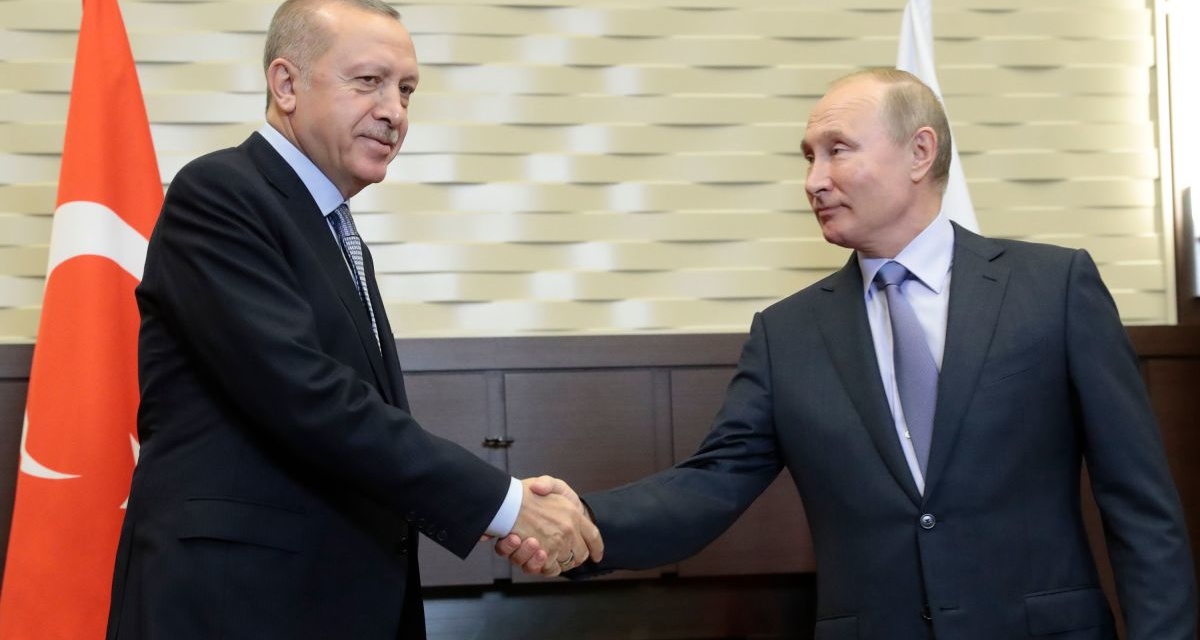Turkish President Recep Tayyip Erdoğan and Russian counterpart Vladimir Putin, Sochi, Russia, October 22, 2019
Turkish President Recep Tayyip Erdoğan and Russian counterpart Vladimir Putin have spoken about escalating tensions in Idlib Province in northwest Syria, with the possibility of military confrontation, but there is no sign of an accommodation.
Meanwhile, UN officials have warned of a “bloodbath” amid the 9 1/2-month Russian-regime offensive that has killed more than 1,800 civilians, wounded thousands, and displaced more than 1 million in the greater Idlib area.
Erdoğan and Putin spoke by phone at 6 pm Ankara time on Friday, a day after Turkey’s first involvement on the Idlib frontline.
Alongside anti-Assad forces, Turkish infantry attacked pro-Assad units who had occupied the town of Nayrab. The pro-Assad forces scattered, but Russian airstrikes ensured that rebels did not recapture the town, between Idlib city and the key town of Saraqeb on the M4 and M5 highways.
The Turkish military said two of its soldiers were killed and five wounded, while asserting that 50 pro-Assad fighters were slain.
See also Syria Daily, Feb 21: Turkey Joins The Fight in Idlib
Erdoğan had warned for weeks of Turkish intervention and demanded that regime forces withdraw from Idlib by February 29. But the Russian-regime offensive seized Saraqeb and advanced in neighboring western Aleppo Province.
The Turkish President has been alarmed by the more than 1 million displaced — out of 3 million residents in the greater Idlib area, about 20% of Syria’s remaining population. The civilians fleeing their homes, many of them without shelter in winter conditions, are trapped between the offensive and a Turkish border closed in 2016.
Putin Refuses to Budge
Erdoğan told Putin that “the Assad regime’s actions”, with their “cruelty” and “persecution of the people of Idlib”, must be stopped.
But Putin offered no assurance to Erdoğan that the offensive would be suspended and the regime forces withdrawn. Instead, he proclaimed “serious concern about the ongoing aggressive actions of extremist groups” and repeated the regime’s line about “unconditional respect for the sovereignty and territorial integrity” of Syria.
The two sides offered the cover of an agreement to “intensify bilateral inter-agency consultations on Idlib”. However, two sets of Russian-Turkish talks in the past two weeks have ended in discord.
Turkish Defense Minister Hulusi Akar had indicated on Thursday that Ankara would seek an agreement with Russia on use of airspace over Idlib — effectively setting up a protection zone for civilians against bombing — and joint patrols.
The two countries have a similar arrangement for northeast Syria, where Turkey moved into two Kurdish cantons in October 2019.
“Humanitarian Nightmare”
The UN Office for the Coordinator of Humanitarian Affairs issued its latest appeal — so far unheeded by Moscow and the Assad regime — for a pause in attacks.
Spokesman Jens Laerke told a news briefing in Geneva:
We call for an immediate ceasefire to prevent further suffering and what we fear may end in a bloodbath.
The front lines and relentless violence continue to move closer to these areas which are packed with displaced people, with bombardments increasingly affecting displacement sites and their vicinity.
UN Secretary General António Guterres amplified the message on Twitter:
The crisis in northwest Syria is taking a terrible toll on civilians.
Hundreds have been killed. Young children are freezing to death.
This man-made humanitarian nightmare for the long-suffering people of Syria must stop.
It must stop now.https://t.co/qIMzCHwvSj pic.twitter.com/j2mrCFCSYF
— António Guterres (@antonioguterres) February 21, 2020
But the statements gave no hope for displaced civilians. At a crowded university building in the town of Azaz, near the Turkish border, grandmother Souad Saleh — in a room with her family and dozens of other peopl — said, “We want to go back home but we can’t. We left things behind because the warplanes were above us and houses were collapsing.”
Bursting into tears, she spoke of the flight from her home: “Everyone was crying.”
Hayat al-Fayad told of her family running of bombing two weeks ago: “The entire village fled.”
The Russian Defense Ministry swept aside the accounts, saying the mass displacement has not occurred.

